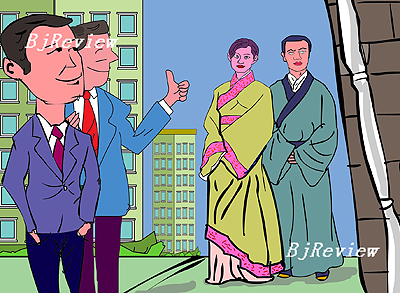
Hanfu , or traditional clothing of the Han Chinese, was long regarded by the country's predominant ethnic group as a very important part of their culture, exemplifying a courteous lifestyle. Confucius (551-479 B.C.), one of China's greatest philosophers, considered Hanfu a required part of Chinese ceremonies and rituals and many of his quotations contain references to Hanfu.
The history of Hanfu goes back as far as the history of the Han people themselves. The wearing of Hanfu was interrupted in the 17th century, when minority Manchu rulers of the Qing Dynasty (1644-1911) forcefully prohibited its use, something that led in time to the garments not widely being regarded in China as a national costume (unlike Qipao). Public awareness of the ancient dress style survives to a limited extent through period dramas and films, but it is generally unknown, having long lost out to more popular Western-style clothing. But that's all about to change if a revivalist movement in traditional Chinese culture takes off, as a central part of the movement is to campaign for the return of Hanfu as the national costume.
Recent examples of the garment's increased popularity show the Hanfu movement is making waves, albeit small ones. On April 9, 2006, in the Beijing-based Renmin University of China, an archery ritual (an important traditional ritual ceremony in ancient China) saw dozens of students in Hanfu reenacting proceedings 200 years after this ceremony was last held.
On May 16, 2006, accepting the suggestion of a local college student, the government of Wuhan, capital city of central China's Hubei Province, organized a traditional rite of passage ceremony for 1,000 18-year-old students all dressed in Hanfu.
During the latest Dragon Boat Festival (June 19), white-collar workers in China's major cities like Beijing, Shanghai, Guangzhou (Guangdong Province), Lanzhou (Gansu Province) and Chengdu (Sichuan Province) donned Hanfu to take part in traditional ritual activities.
And it's not only in China that Hanfu is making a comeback. Overseas Chinese are also passionate about this ancient fashion, which they regard as a symbol of their identity as Han people. For example, in Japan, some Chinese students have begun wearing Hanfu, while in Canada, Chinese have set up a Hanfu revival association. And increasingly, the central theme through all the emerging calls by Hanfu advocates is to have it accepted as the national costume.
As with all campaigns, there are detractors, who say the traditional costume is a superficial part of the traditional culture. For them, it is only the prized ancient arts of literature and philosophy that represent the true essence of Chinese traditional culture. The Hanfu revival has emphasized too much form and it may lead to narrow-minded nationalism, caution these critics.
Let's put it on
Gong Dao (Guangzhou Daily): While some may sneer at these Hanfu lovers and the Hanfu revival movement, saying that their costumes are just for show and totally incompatible with modern life, we can still see the value of this costume.
The significance of the existence of a national costume is quite obvious: First, it is the cultural symbol of the country and the nation; second, it consolidates the cohesion of a nation; and third, it is a tradition that can be left to generations to come. At traditional festivals and on important occasions, in many countries, people will put on their traditional costumes. The Japanese have kimonos, the Koreans have hanboks, the Indians have sarees and the Scots wear kilts. Yet the Chinese, who boast such a long history and so rich a culture, only have Western suits, which have absolutely nothing to do with its traditional culture.
If a nation sticks only to its tradition and rejects creation and innovation, it's absolutely unacceptable; conversely, neither is it wise for a nation to concentrate only on revolution and innovation, losing its tradition. The Chinese traditional culture, Hanfu included, was for long periods denied and trampled upon. Today, while the culture gradually recovers, China is faced with the competition of strong cultural influence from Korea, Japan and Western countries. Maybe we need more Hanfu supporters to launch more campaigns for this beautiful traditional costume to be felt and for the maintenance of Chinese traditional culture.
Chang Mengfei (Jiangnan Times): On the issue of Hanfu, the most common argument from the opponents is: If all the Chinese are required to wear Hanfu, what about the other 55 minority ethnic groups in China? Here, supporters of Hanfu are accused of exercising Han chauvinism, triggering conflicts between the Han people and China's other ethnic groups.
However, so far, not a single Hanfu initiator or supporter has ever suggested that the other 55 ethnic groups in China also don Hanfu and abandon their own traditional costumes. Even the scholars who support Hanfu as the ritual costume for the 2008 Olympic Games recommended that this costume only represents Han athletes in the Chinese Olympic team.
The preference for a particular style of clothing is a personal choice that has nothing to do with patriotism or nationalism.
|
